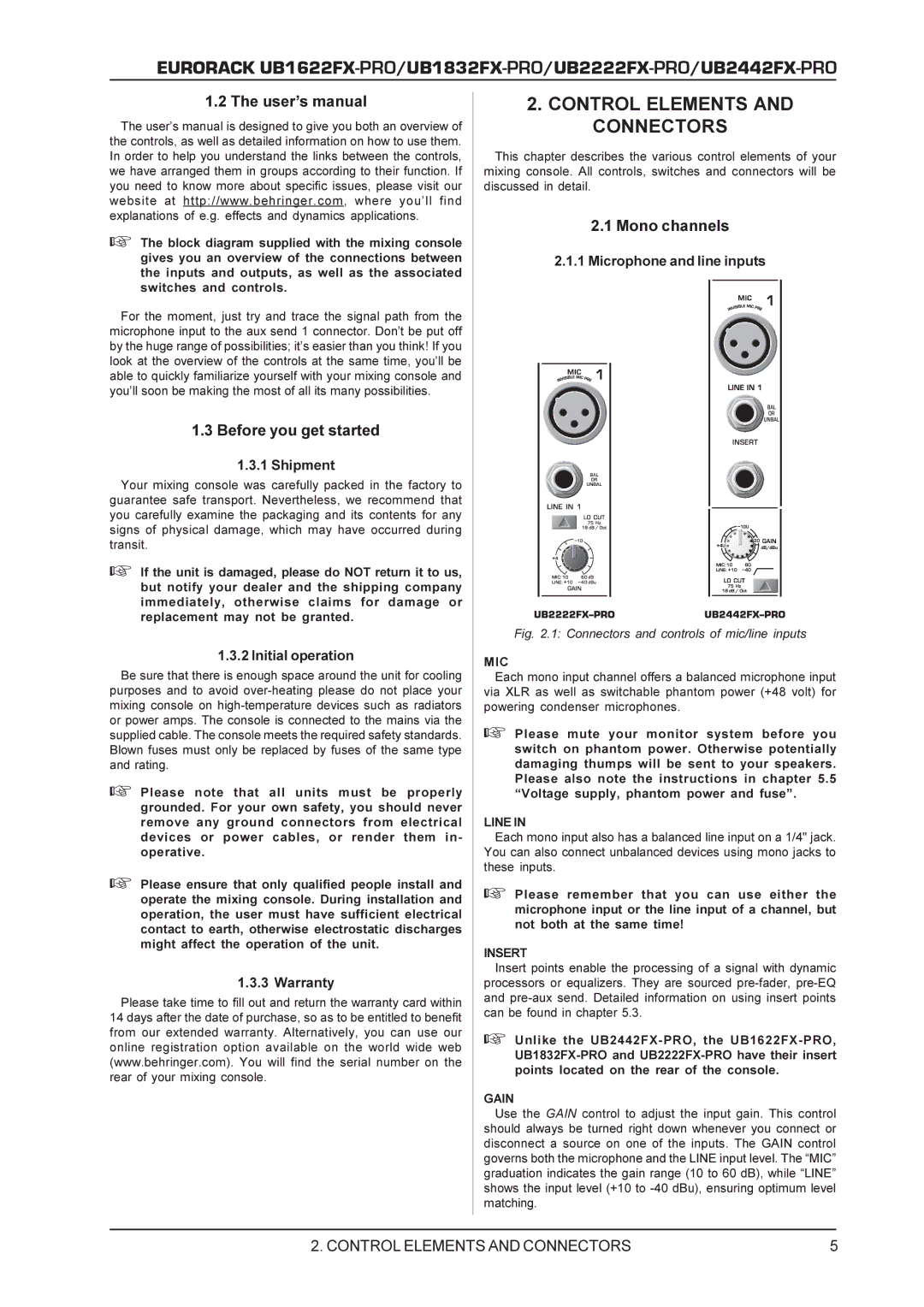
EURORACK
1.2 The user’s manual
The user’s manual is designed to give you both an overview of the controls, as well as detailed information on how to use them. In order to help you understand the links between the controls, we have arranged them in groups according to their function. If you need to know more about specific issues, please visit our website at http://www.behringer.com, where you’ll find explanations of e.g. effects and dynamics applications.
+The block diagram supplied with the mixing console gives you an overview of the connections between the inputs and outputs, as well as the associated switches and controls.
For the moment, just try and trace the signal path from the microphone input to the aux send 1 connector. Don’t be put off by the huge range of possibilities; it’s easier than you think! If you look at the overview of the controls at the same time, you’ll be able to quickly familiarize yourself with your mixing console and you’ll soon be making the most of all its many possibilities.
1.3 Before you get started
1.3.1 Shipment
Your mixing console was carefully packed in the factory to guarantee safe transport. Nevertheless, we recommend that you carefully examine the packaging and its contents for any signs of physical damage, which may have occurred during transit.
+If the unit is damaged, please do NOT return it to us, but notify your dealer and the shipping company immediately, otherwise claims for damage or replacement may not be granted.
1.3.2 Initial operation
Be sure that there is enough space around the unit for cooling purposes and to avoid
+Please note that all units must be properly grounded. For your own safety, you should never remove any ground connectors from electrical devices or power cables, or render them in- operative.
+Please ensure that only qualified people install and operate the mixing console. During installation and operation, the user must have sufficient electrical contact to earth, otherwise electrostatic discharges might affect the operation of the unit.
1.3.3 Warranty
Please take time to fill out and return the warranty card within 14 days after the date of purchase, so as to be entitled to benefit from our extended warranty. Alternatively, you can use our online registration option available on the world wide web (www.behringer.com). You will find the serial number on the rear of your mixing console.
2.CONTROL ELEMENTS AND CONNECTORS
This chapter describes the various control elements of your mixing console. All controls, switches and connectors will be discussed in detail.
2.1Mono channels
2.1.1Microphone and line inputs
Fig. 2.1: Connectors and controls of mic/line inputs
MIC
Each mono input channel offers a balanced microphone input via XLR as well as switchable phantom power (+48 volt) for powering condenser microphones.
+Please mute your monitor system before you switch on phantom power. Otherwise potentially damaging thumps will be sent to your speakers. Please also note the instructions in chapter 5.5 “Voltage supply, phantom power and fuse”.
LINE IN
Each mono input also has a balanced line input on a 1/4" jack. You can also connect unbalanced devices using mono jacks to these inputs.
+Please remember that you can use either the microphone input or the line input of a channel, but not both at the same time!
INSERT
Insert points enable the processing of a signal with dynamic processors or equalizers. They are sourced
+Unlike the
GAIN
Use the GAIN control to adjust the input gain. This control should always be turned right down whenever you connect or disconnect a source on one of the inputs. The GAIN control governs both the microphone and the LINE input level. The “MIC” graduation indicates the gain range (10 to 60 dB), while “LINE” shows the input level (+10 to
2. CONTROL ELEMENTS AND CONNECTORS | 5 |
